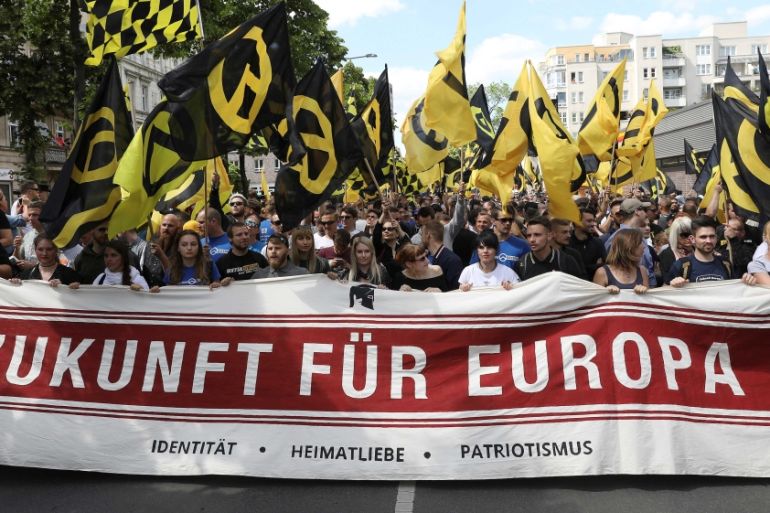Austria cracks down on far-right Identitarian Movement
Analysts say arrests of Identitarians could be ‘major blow’ to the anti-migrant, anti-Muslim group.

A slew of charges against several members of the far-right Identitarian Movement in Austria could be a “major blow” to the organisation’s ability to mobilise, experts and analysts say.
Last week, prosecutors in Graz announced that 17 members and “sympathisers” of the Identitarian Movement were charged with a slew of offences, including forming a criminal organisation, hate speech, property damage and coercion.
Keep reading
list of 4 itemsGermany bans far-right Austrian nationalist Martin Sellner from entry
Australian efforts on Islamophobia flag despite Christchurch wake-up call
Norway court says mass killer Breivik’s prison isolation not ‘inhumane’
Among those arrested and charged were leading figure Patrick Lenart and Martin Sellner, the group’s de facto spokesperson.
Analysts and observers say the movement is part of a far-right international network that advocates for the expulsion of refugees and migrants from European countries.
The UK-based HOPE Not Hate group, which monitors the far right, explained that the charges could affect both the Austrian branch and the wider Identitarian Movement (also known as Generation Identity).
Simon Murdoch, a researcher at HOPE Not Hate, said the arrests “could really undermine their Austria branch”, which is a pivotal segment of the broader movement.
“As it is one of the oldest, it is both one of the most extensive and most tried-and-tested branches of the [Identitarian] movement,” Murdoch told Al Jazeera.
“Given how pivotal the branch is to the movement, therefore, this will no doubt have a real knock-on effect.”
Speaking to Al Jazeera by email, Sellner said police raided his home and nine others when they carried out the arrests.
He was released after interrogation.
Sellner decried the charges as “a severe act of repression” and said the government is seeking to “criminalise patriotic protest”.
“We are criticising the Islamisation of Europe,” he said.
“We believe that [the charges are] not supported by the majority of Austrians, as [they have] already received a lot of criticism from many prominent voices.”
At the time of publication, Austrian police had not replied to request for a comment.
Active in several European countries – including France, Italy, Germany and Austria – the Identitarian Movement promotes anti-migrant and anti-Muslim rhetoric.
Bernhard Weidinger, a researcher at the Documentation Centre of Austrian Resistance (DOW), an organisation that monitors fascism and neo-fascism summarised the group: “The direction, according to them, that Austria should develop is clearly anti-immigrant.”
He added: “They demand mass deportations.”
Nonetheless, Weidinger expects that prosecuting them will be a challenge. “The intent here is to criminalise the entire organisation,” he told Al Jazeera. “If you look at the legal situation, this will be difficult.”
‘Defend Europe’
In March 2018, Sellner and his partner, Brittany Pettibone, were denied entry to the UK while travelling to attend a far-right event.
In 2017, the group chartered a boat with the goal of blocking NGO vessels helping refugees and migrants in the Mediterranean Sea.
That mission collapsed when the far-right boat was blocked from refueling in Greece and Tunisia and blocked passage when authorities in northern Cyprus arrested several passengers on charges of people smuggling.
The “Defend Europe” boat action was praised by David Duke, the former imperial wizard of the Ku Klux Klan (KKK) in the US. Duke encouraged his more than 40,000 Twitter followers to donate to the movement.
![Martin Sellner, the group's de facto spokesperson, was among those arrested in Austria [File: Antonio Parrinello/Reuters]](/wp-content/uploads/2018/05/81581bd1a5c74f29a0d913ddbcfdc224_18.jpeg)
The action widely decried by activists, aid groups and human rights organisations.
In April 2016, Sellner and other Austrian Identitarians scaled the headquarters of Austria’s Green Party and unfurled a banner accusing the party of supporting the “Islamisation” of Europe.
That same year, members of the group stormed the stage of a play being performed by refugees in Vienna, the Austrian capital. They sprayed fake blood and tossed fliers proclaiming that “multiculturalism kills”.
In the past, several members of Germany’s Identitarian Movement have been affiliated with the neo-Nazi National Democratic Party and the far-right Alternative for Germany.
In March 2017, Hans-Georg Maassen, head of Germany’s domestic intelligence agency, said many Identitarians were under surveillance and the group was growing increasingly “radicalised”.
Mounting criticism
Last week’s arrests come at a time of mounting criticism of the Austrian government, which includes the far-right Freedom Party of Austria (FPO) as a junior coalition.
Since the right-wing Austrian People’s Party (OVP) and the FPO reached a deal to form a government in December, the latter has been widely condemned over a spate of controversies.
In recent months, several FPO members were expelled for expressing pro-Nazi propaganda and making anti-Semitic comments.
DOW’s Weidinger said the Identitarian Movement has “not so clandestine” links to the FPO, although the ties are unofficial.
![Identitarian Movement members stage high-profile direct actions against immigration [Hannibal Hanschke/Reuters]](/wp-content/uploads/2018/05/87ed5d17448e49be8a3aa70685d32dad_18.jpeg)
In the past, FPO members have delivered speeches at Identitarian Movement events.
Farid Hafez, a senior research scholar at Georgetown University’s The Bridge Initiative, argued that the government has been largely “silent on right-wing extremism”.
“The FPO now focuses more on expanding its power and silencing the opposition against right-wing groups,” he told Al Jazeera.
Hafez explained the Social Democratic Party of Austria and other opposition parties have seized opportunities to point out connections between the FPO and other groups on the far right.
“On the other side, the opposition tries even more to use every single event of right-wing extremist group, especially groups with Neo-Nazi ideologies, to make the public aware of the links to FPO functionaries and activists.”